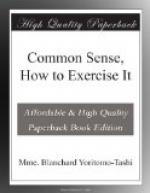This is the logic which is called practical sense.
Yoritomo continues, saying that there is a very close connection between the faculty of judging and that of deducing.
“Practical sense, allied to common sense, comes to the assistance of the latter, when it is tempted to reject the chain of analogy, whose representation too often draws one far from the initial subject.
“It facilitates coordination, clearness, and precision of thought.
“It knows how to consider contingencies, and never fails to have a clear understanding of relative questions.”
And to illustrate his theory, he cites us an example which many of our young contemporaries would do well to remember.
“There was,” said he, “in the village of Fu-Isher, a literary man, who wrote beautiful poems.
“He lived in great solitude, and no one would have heard of his existence if it had not been that my master, Lang-Ho, while walking in the woods one day, was attracted by the harmonious sounds of poetry, which this young man was reciting, without thinking that he had any other listeners than the birds of the forest.
“Lang-Ho made himself known to him and began to question him.
“He learned that he did not lack ambition, but, being poor, and having no means of approaching those who would have been able to patronize him, he was singing of nature for his own pleasure, waiting patiently until he should be able to influence the powerful ones of the earth to share his appreciation.
“Lang-Ho, touched by his youth and his ardor, pointed out to him the dwelling of a prince, a patron of the arts, and, at the same time, told him how he ought to address the nobleman, assuring him that the fact of his being a messenger from a friend of the prince would open the doors of the palace to him.
“The next day the young poet presented himself at the home of the great lord, who, knowing that he had been sent by Lang-Ho, received him in spite of the fact that he was suffering intensely from a violent headache.
“He learned from the young man that he was a poet and treated him with great consideration, making him understand, however, that all sustained mental effort was insupportable to him on that day.
“But the poet, not paying attention to the prince’s exprest desire, unrolled his manuscripts and began reading an interminable ode without noticing the signs of impatience shown by his august hearer.
“He did not have the pleasure of finishing it.
“The prince, seeing that the reader did not understand his importunity, struck a gong and ordered the servant who appeared to conduct the young man out of his presence.
“Later, he declared to Lang-Ho that his protege had no talent at all, and reprimanded him severely for having sent the poet to the palace.
“But my master did not like to be thus criticized.
“So, a little while after that, one day, when that same prince was in an agreeable frame of mind, Lang-Ho invited him to the reading of one of his works.




